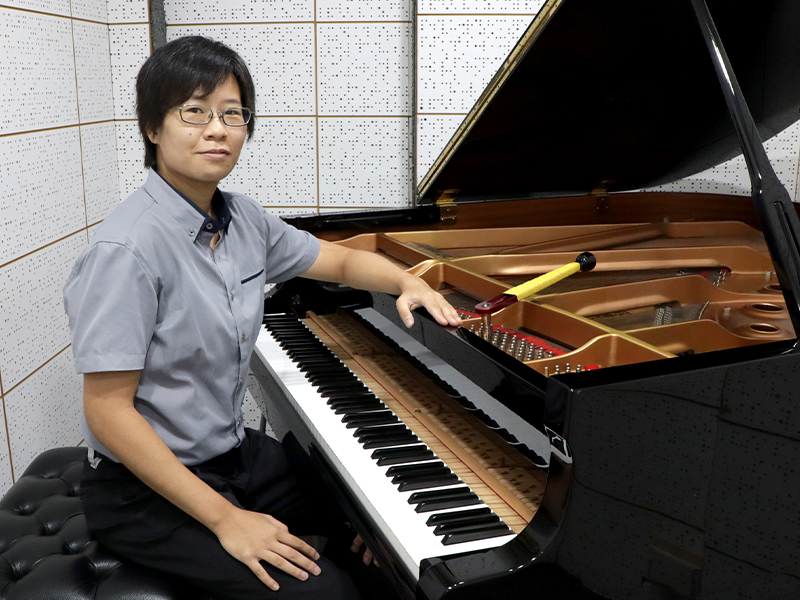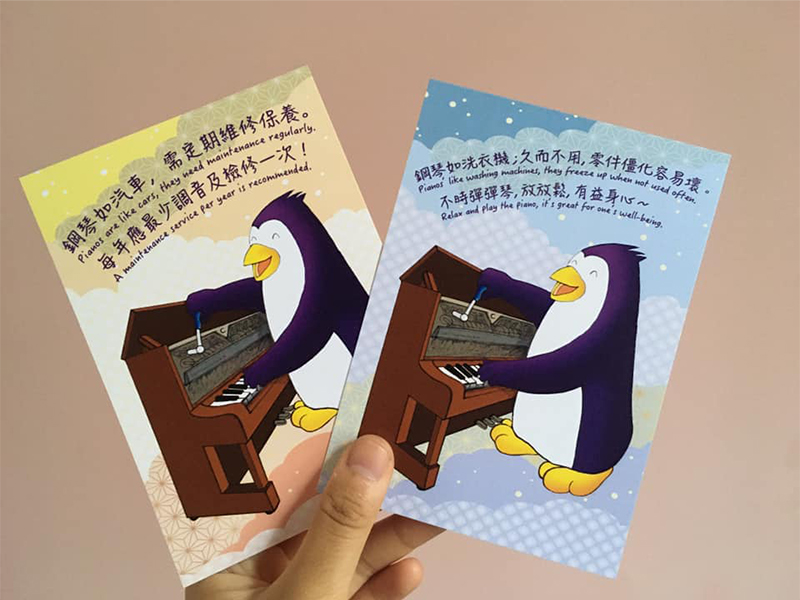Our series of online people profiles covers a wide range of backgrounds, careers and personalities of individuals in Hong Kong. Here, we meet CHUNG WAN CHOI of Kata Music, a rare female piano technician in Hong Kong!
You were born and raised in Hong Kong, but where else in the world have you lived?
I spent a year in Germany as a secondary school exchange student. It was before everything was available on the internet, and only a few people had mobile phones. I carried a small dictionary everywhere!
After finishing A-Level examinations in Hong Kong, I left for the United States to pursue professional training in music composition at Mannes College of Music in New York City. My interest in ethnic drumming brought me to taiko – Japanese drumming. This led me from New Jersey to Pittsburgh and then Hawaii, and it was there that I stumbled across piano tuning. I ended up finishing my second master’s degree in a rare major called “Piano Technology” at Florida State University.
And now you’re back in HK, using those studies to help people with their pianos!
Yes, my business primarily provides tuning, repair, maintenance and evaluation services of pianos and early keyboard instruments such as harpsichords. I also offer music arrangement, transcription and typesetting.
Is it a difficult job?
The work of a piano technician is rather straightforward; here’s a piano, now fix it and make it sing! Tuning a piano properly is not easy; while many technicians use electronic tuning devices to assist with listening, I primarily tune aurally. Reliable devices and apps are extremely complex products that cost a fortune. Nonetheless, they’re meant to assist, but never to replace a technician’s hearing.
Why “Kata Music”?
I’m drawn by the spiritual concept of kata, which means “foundation” or “form” in Japanese. It’s crucial to taiko drumming and many traditional Japanese arts. Through kata, one develops skills and strength through old-fashioned physical and emotional training until true mastery and confidence emerge.
Are there many piano technicians in Hong Kong? What about women technicians specifically?
I’m not sure, though I have once heard there are about 150 of us. However, I might be the only female piano technician in Hong Kong. Unfortunately, for a long time there was a tendency to take on male apprentice technicians; some said this was on account of physical strength; others argued it would be dangerous for women to visit the private home of a stranger to do a service. Plenty of excuses are used like this. In the end, it’s not a large field, and it has been a ‘man’s world’ for decades, so I don’t see why it would change by itself.
In the US, there is a vocational school for piano technology, where male and female students are welcome under a school system. The programme is taught by established male and female faculty, and I’ve met numerous female graduates who are very competent technicians. Some of them are very petite, too. As with taiko and kata, physical strength is gained through training; brute force has no place in any sophisticated craft! In the future, I hope to train local female apprentices.
What kind of piano problems do you fix?
My major experience was working at a huge university music department. The school has over 250 upright and grand pianos, ranging from dingy console pianos to the shiny nine-foot Steinway concert grand pianos used in concert halls. Aside from tuning and repairing the pianos, I implemented an online report system which allows students to scan a QR code and inform a piano technician when a piano needs attention.
Just about anything can happen to a piano in a university setting: missing hammers, broken strings, broken pedals, sticky keys, spilled coffee, dropped chewing gum, caramel chocolate melted into keys, mysterious buzzing noises …!
For better maintained pianos such as those in concert halls, more artistic attention is required. This includes solid and fine tuning, voicing, regulation and eliminating the little noises that drive artists crazy.
I also offer an evaluation service where I examine a piano before a buyer decides to purchase one second-hand from a private owner.
Tell us about your work with early keyboard instruments.
The modern piano didn’t exist when Mozart and Beethoven composed their masterpieces; the pianos they used were drastically different in sound, touch, dynamics and size. As a result, early keyboard performances today involve the use of historical instruments (often replicas) from those periods, and performers who are inspired by in-depth historical research. Very few technicians are interested in servicing these instruments, but oddly enough I am! I find the work very intriguing.
How are your piano playing skills?
I’m actually quite bad at playing the piano. The good news is that piano playing skills are not required to be a piano technician (nor perfect pitch)! However, knowledge of piano playing and music theory help tremendously in understanding the theory of piano tuning.
Give us an insight into a typical day.
It varies. If I have piano service appointments, I fill up my giant backpack with tools and supplies before my trip. Depending on the client’s location, travel time could be long as two hours on public transport. I usually try to come home by dinner time. In the evening, I do stretches, because this line of work is known to cause repetitive stress injuries.
If I have a day off, I like to be spontaneous. I might read, go cycling or hiking, do a kettlebell workout, surf the internet, try a little woodwork project, organise my piano tools and supplies, maintain my websites, or draw some cute penguins!
Outside of your work, what are your hobbies in Hong Kong?
I like to ride around on my road bike. Lately, I’ve been staying at home a lot due to the pandemic, so I’ve been practicing more frame drumming and shamisen (a Japanese three-string instrument). I’m also excited to finally have time to catch up reading all the music books and research papers I collected during my research studies. During “normal” times, I love going to the theatre and to classical music concerts.
Find out more about Chung Wan Choi’s work at her Facebook page and Instagram @ katamusic.hk.
katamusic.hk
Like this? See more in our Living in Hong Kong section.








